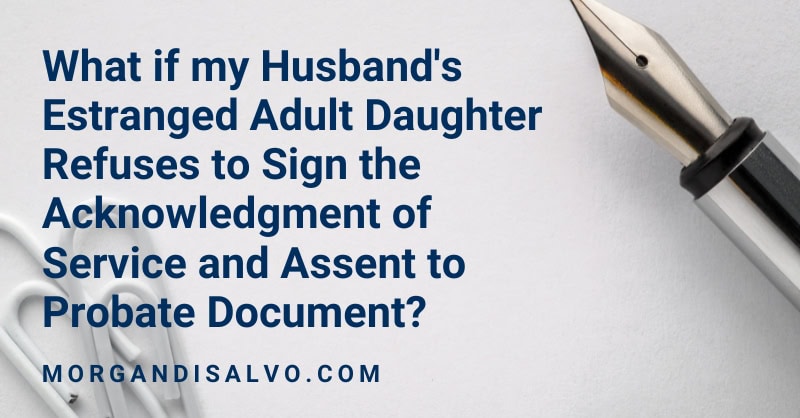Question: What do I do if my husband’s estranged adult daughter refuses to sign the Acknowledgment of Service and Assent to Probate document? She is not in the Will. He specifically wrote in his Will, “All other names not listed here are not being provided for.”
What happens if after she is served, she still refuses to sign the document? Will I be able to move forward with probate?
Loraine’s Answer: While a probate will move forward more quickly if all heirs sign the Petition to Probate Will, they are not required to do so. In Georgia, an heir who signs a Petition to Probate Will on the Acknowledgment of Service and Assent to Probate is giving consent to the probate and effectively giving up that heir’s right to try to challenge the Will. If an heir refuses to sign the Petition to Probate Will, the Petition can be filed without that heir’s signature. That heir must then be served with notice that the Petition has been filed and will have a period of time in which to make any objection to the probate that heir might have. The probate court will have the heir served after the Petition has been filed.
If an heir fails to object within the allotted time, the Petition will generally be granted, and the Will will generally be admitted to probate.
For you, this means that you can file the Petition without your husband’s estranged daughter signing it. It also means that, even if the daughter objects to the Will, the Will may still be admitted to probate if her objection fails.
Whenever there are family estrangements, it’s a good idea to try to reduce the chance that your Will will need to be admitted to probate. If no probate is needed unhappy heirs are deprived of a formal opportunity to challenge the Will. One of the best ways to reduce or eliminate the need to have your Will admitted to probate is to use a fully funded revocable living trust coupled with carefully drafted beneficiary designations and, in some cases, joint ownership with rights of survivorship, as part of your planning. If assets are already owned by a revocable trust at your death, then your Will does not control those assets. Similarly, a Will does not control assets that pass outside of your probate estate under a beneficiary designation or a right of survivorship. If no assets become part of your probate estate at your death, then your Will does not have to be offered for probate and notice to the heirs may not even be needed.
Key Estate Planning Takeaways: A Will can generally still be offered for probate even if one or more of the heirs refuses to consent to the probate. However, the process of having a Will admitted to probate can take longer and be more difficult if one or more of the heirs refuse to consent. For that reason, if family estrangements exist, or if the estate plan will result in an heir being disinherited or treated differently from other heirs, you should consider using a fully funded revocable living trust, along with carefully drafted beneficiary designations, and carefully considered rights of survivorship as part of your estate planning, since using these techniques can significantly reduce the chance that a probate will be needed and thereby help avoid the need for a probate.
This “Q&A with Loraine” blog series is inspired by answers from Morgan + DiSalvo Partner Loraine DiSalvo to actual user questions posted by individuals on www.avvo.com. This blog is a more in-depth response than is permitted on their site. To view the original question and Loraine’s abbreviated response, click here.


